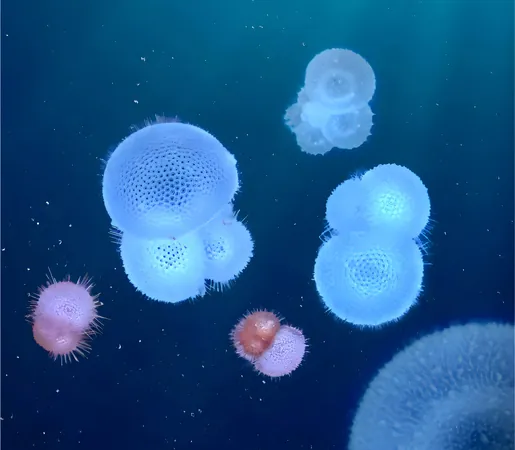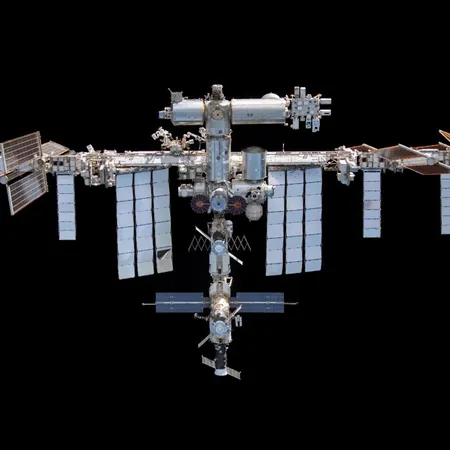
The Hidden Crisis: Climate Change Threatens Essential Marine Life
2024-11-14
Author: Rajesh
Understanding Climate Change and Its Impact on Marine Species
Planktonic foraminifera are tiny, single-celled organisms residing in the oceans, known for their intricate calcium carbonate shells. These shells are vital for the overall health of marine ecosystems, acting as both habitat and food source for larger marine life. Alarmingly, these creatures are now facing unprecedented challenges from climate change, with projections suggesting that many species may exceed their survival limits by the century's end.
Recent research highlights a troubling trend: shifting environmental conditions are pushing these organisms towards extinction, particularly in tropical waters. This loss could unleash a cascade of negative effects on marine ecosystems and compromise the ocean's ability to store carbon, a significant concern in the fight against global warming.
Dramatic Findings from Global Research Collaboration
An international team of scientists from France, Germany, the Netherlands, Japan, and Spain undertook a comprehensive review of nearly 200,000 datasets dating back to 1910. Their results reveal alarming changes in foraminifera populations, including their migration towards cooler waters at alarming rates of up to 10 kilometers (6.21 miles) per year. Many species are even delving deeper into the ocean in a desperate attempt to escape rising surface temperatures.
Despite their resilience, foraminifera populations have plummeted by approximately 25% over the past 80 years, with tropical species bearing the brunt of this decline due to intensified warming disrupting reproductive cycles. Compounding this crisis, rising CO2 levels and ocean acidification hinder the formation of their essential calcium carbonate shells.
Why the Plight of Foraminifera Matters
The question arises: why should we be concerned about these tiny organisms? According to lead researcher Sonia Chaabane from the Max Planck Institute for Chemistry, foraminifera act as "sentinels" of marine ecosystem health, signaling the urgent effects of climate change and acidification. When these organisms die, their empty shells sink to the ocean floor, trapping carbon in the process. A decline in foraminifera means less carbon storage, disrupting the ocean's carbon cycle, a key component of global climate regulation.
Experts urge us to consider the implications of these changes beyond mere numbers. Ralf Schiebel of the Max Planck Institute emphasizes the importance of using bioindicators like foraminifera to develop a broader understanding of the intricate relationship between climate and marine ecosystems.
The Impact of Future Research and Policy Changes
The current trends in foraminifera populations present a sobering glimpse into a future where marine ecosystems face severe disruption. If unchecked, the consequences could destabilize entire marine food webs, putting immense pressure on species vital for human consumption, including fish that make up a significant portion of the global diet.
In response to these findings, scientists and policymakers are advocating for urgent reductions in carbon emissions and the adoption of conservation strategies to mitigate further environmental impacts. International collaboration and a commitment to sustainable practices are critical to reversing these troubling trends.
The Broader Picture: Insights from Marine Microorganisms
This research not only raises alarms but also highlights the countless possibilities lying in the study of marine microorganisms. Planktonic foraminifera offer valuable insights not only into current environmental challenges but also into historical climate patterns, helping predict future shifts in conditions.
Engaging with these findings fosters a deeper appreciation for Earth's biodiversity and its interconnectedness, serving as a reminder that even the smallest marine inhabitants play a vital role in our planet's health.
As we navigate this climate crisis, recognizing the interdependence of life on Earth is more important than ever. The fight to protect these crucial organisms—and the ecosystems they support—could very well be a fight for the future of our planet as a whole.



 Brasil (PT)
Brasil (PT)
 Canada (EN)
Canada (EN)
 Chile (ES)
Chile (ES)
 España (ES)
España (ES)
 France (FR)
France (FR)
 Hong Kong (EN)
Hong Kong (EN)
 Italia (IT)
Italia (IT)
 日本 (JA)
日本 (JA)
 Magyarország (HU)
Magyarország (HU)
 Norge (NO)
Norge (NO)
 Polska (PL)
Polska (PL)
 Schweiz (DE)
Schweiz (DE)
 Singapore (EN)
Singapore (EN)
 Sverige (SV)
Sverige (SV)
 Suomi (FI)
Suomi (FI)
 Türkiye (TR)
Türkiye (TR)